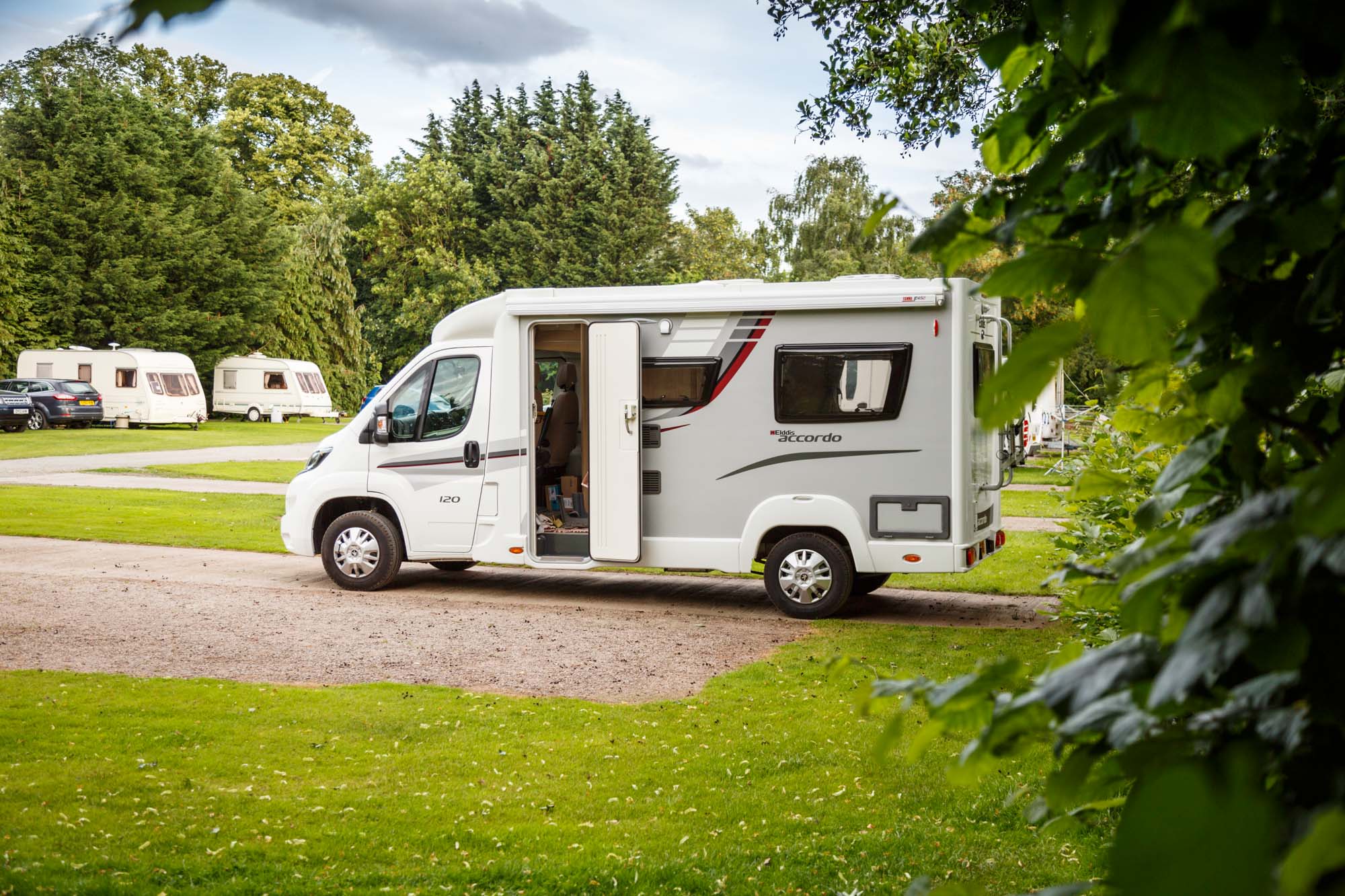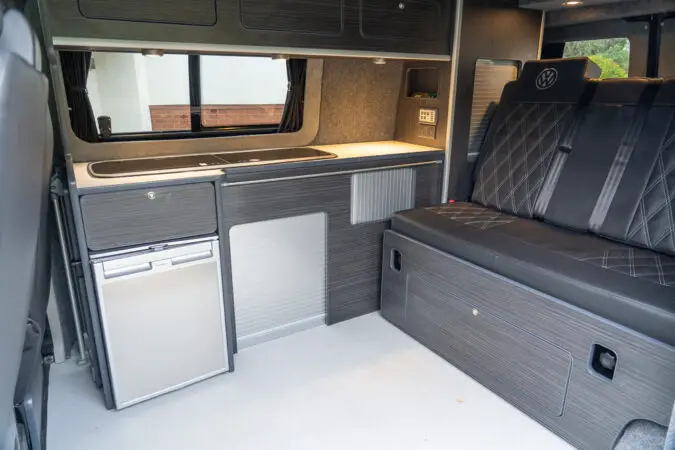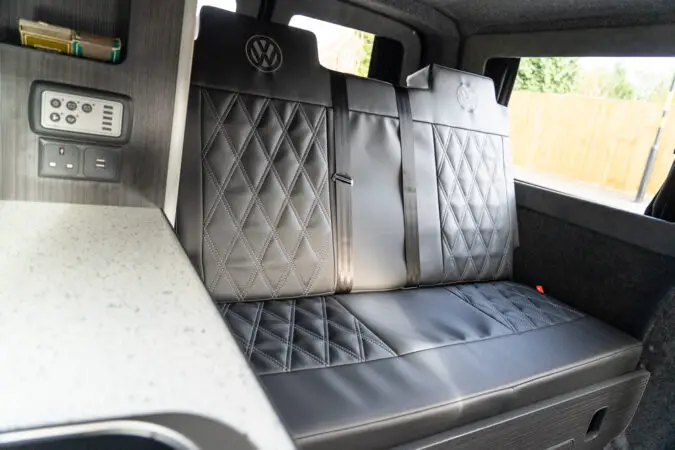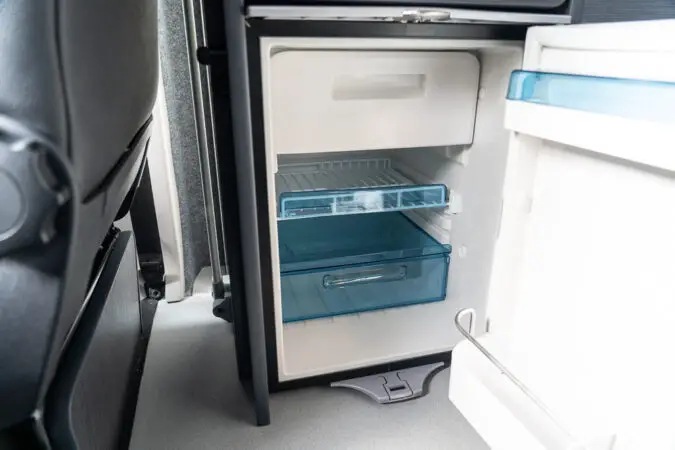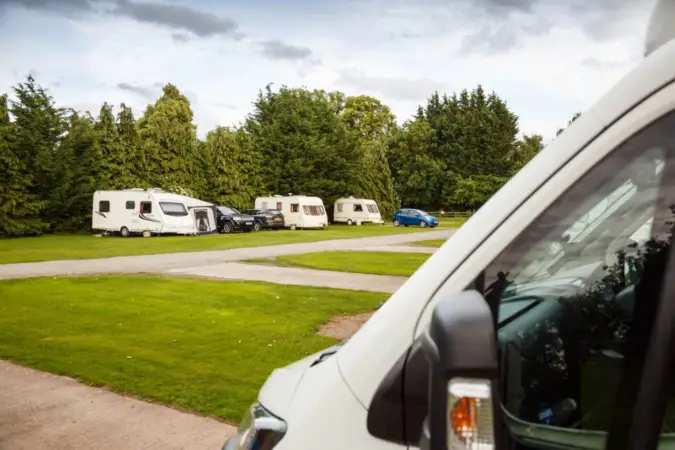RV living is becoming ever so popular in recent years. Maybe you even know someone who’s embraced the RV lifestyle. There are around a million Americans that now live full-time in RVs. And now you’re wondering, should you do it as well? What’s it like?
By the way, we’re talking about living in an RV on the move and not stationary RV living. The latter is living in an RV, but you stay in one place for an extended period of time. This post will focus mostly on nomadic RV living where you live and travel in your RV.
From the pros and cons, the potential costs, and tips should you decide to embrace this lifestyle. Hopefully, it’ll help you decide if RV living is for you. Here’s the table of contents to help you navigate:
RV Living Pros
So, let’s get right into it, here are the pros if you choose to embark on that RV life:
1. Travel The Country – From The Comfort Of Your Home
The first and obvious pro-RV argument would be traveling without ever really leaving the comfort of a house. Rather than leave your house, your house is the travel transport. This means you can take your kitchen, your fridge, your bed, and pretty much any belongings you can fit in the RV.
Now, if you’re not really the traveling type, then there’s not much point in reading on. This is often the main reason why people live in an RV, as you can live and travel at the same time. If you’ve always wanted to travel the country, especially see more of the countryside, then the RV life might be for you.
Additionally, traveling in an RV can be cheaper. Mostly because you can shop for groceries and cook in your RV rather than eat out as you normally do when traveling. Needless to say, eating out is more likely than not will end up being more expensive than cooking.
2. Don’t Like Your Neighbors? You Can Easily Move
Got a noisy neighbor? Or is the weather too hot for your liking at this time of year? Regardless of what you don’t like, you can easily move if you’re not quite happy with your current campsite. That’s the beauty of the nomadic lifestyle.
If you live in a conventional home, moving takes much longer and is a much more difficult process. There’s paperwork, you need to find a new place, not to mention all the packing and hauling of your belongings to the new place. This process can take anywhere between a couple of weeks to months.
Meanwhile, with an RV you can go, quite literally, where the wind takes you. It’s too hot where you are right now? Let’s go somewhere that’s a bit colder at this time of year. Just remember to fill up the RV with gas before you go.
3. RV Living Can Potentially Give You More Personal Time
If you embrace the RV lifestyle, there are several things you wouldn’t have to do unlike living in a conventional home. For one, living in an RV means you probably don’t have a conventional 9-to-5 job where you have to commute to an office. As a result, you won’t have to spend 2 – 3 hours a day commuting to and from the office.
You can spend the entire day at your mobile home, potentially traveling to somewhere with a beautiful view rather than to an office. Or at least, that time you would normally spend commuting, could now be used for something else. Such as learning how to cook better, learning other new skills, or just spending more time with your loved ones.
Living in an RV also means chores typically take quicker to do. Even the biggest RVs will likely still take less time to clean than a house or apartment. So, you can instead use your time for something else that you actually enjoy.
That being said, there are some chores unique to the RV lifestyle. Such as washing your RV every once in a while, and of course, black water disposal just to name a couple. Everyday chores will likely take quicker, but there are some RV cleaning you will need to do every once in a while.
4. RV Living Will Get You Closer With Your Loved Ones
This might be a double-edged sword, but RVs are not very big. This means you have no choice but to be close to the people you’re living with. It might be an issue if you value personal space a lot, but it can also be an opportunity for you to be closer to your loved ones.
Many RVers have said that they’ve become closer than ever with their loved ones after living in an RV. Partly it has to do with the lack of personal space. This means there’s very little space for hiding emotions, and you’ll be forced to resolve conflict no matter what – potentially bringing you closer together.
And partly, it has to do with point number 3, where you have much more personal time when you live in an RV. Since there’s no commute, chores take shorter, you can instead spend time with your family. In any case, there’s a huge chance you’ll be closer to your family if you live in an RV – literally and figuratively.
RV Living Cons
So far, sound good? Well, before you jump into the lifestyle, there are several drawbacks of RV living that you should know about:
1. Lack Of Personal Space
When we said you’ll be closer with your loved ones, the other edge of the sword you should consider is the lack of personal space. RVs are much smaller than your typical home, and in most RVs, there are no dedicated rooms.
So, if you feel like your significant other or your family is bugging you, there won’t be anywhere to escape. Unless you go out of the RV and take a walk. Not a big deal if you like walking, but what if you just want to spend some time on your own playing Candy Crush on an iPad?
This is also something you should consider if you have a teenage child. They typically need more space than younger children, and the lack of it might lead to some family problems. The point is, this is something you should really consider.
As someone who values personal space greatly, this is something I would think over and over again before deciding on whether or not I want to take on the RV life. If you think you won’t have any problem being cooped up with little-to-no personal space, then no problem. But if you value personal space a lot, you might want to reconsider.
2. Limited Work Option
As you can imagine, if you spend your entire time traveling in an RV, you won’t be able to do the typical 9-to-5 office job. You’ll need to find work that allows you to work remotely five days a week.
If you’re internet-savvy, you’ll know that there are plenty of jobs that allow you to work remotely. Writers, programmers, and video editors can all work remotely – especially if they choose the freelancing route.
The good news is there are plenty of remote jobs that you can find these days. Especially since the COVID-19 pandemic, many companies now realize that many types of work can be done remotely. Additionally, many companies are experiencing a labor shortage right now, so you might have some more bargaining power.
The video above recommended searching for work via FlexJobs. And the site has filters, so you can immediately find openings for remote jobs. Note that remote work will often be a part-time position. Additionally, you might have difficulty finding work depending on your field and specialty.
One interesting takeaway from the video is to mention that you’re looking for remote work when you hand in your resignation. If your current employer values you and wants to keep you, they might offer you the ability to work remotely. If you’re happy with your current company, why look for a new one?
Note that remote work means you’ll need an internet connection 24/7. Otherwise, how are you going to work? While there are plenty of plans you can choose from, they’re not going to be as fast as a home connection, and definitely not as stable. But we’ll talk more about this later.
3. You’ll Need To Downsize
The limited space of your RV means you won’t be able to take many belongings with you, so you’ll have to downsize. If you have a lot of personal items, you will need to leave some of them behind.
For example, if you used to have a garage as a space to work on your project car, well, you can’t have that anymore. You can still buy a trailer and haul your project car with you, but you won’t have a garage to work on it anymore.
Other simpler examples include your children’s toys and furniture. Probably not a big deal, but if you’re forced to leave a family heirloom behind, you’re going to have a hard time parting with them before setting on your RV life.
This downsizing may affect other aspects of your life as well. For example, some RVs don’t have space for a washer and dryer. This means you’ll need to go to a laundromat if you need to do your laundry, rather than just throwing them into your washer at home.
Another way you’ll need to downsize is when you go grocery shopping. Most RVs will not fit residential fridges, even larger RVs will have trouble fitting them in. So, you can’t store as many groceries as you could at home. This means you’ll need to shop less, and likely more frequently.
4. You’ll Always Need To Find Parking
RV living means you can travel the country without ever really leaving home. However, you’re going to have to find a suitable parking space for your home every night of the year. This will involve a lot of planning ahead.
If you don’t plan ahead, you might be stuck in the middle of nowhere with no real place to park your RV. Sure, you can find just any parking spot, but then how safe will those be? Ideally, you’ll want to stop at an RV campsite.
This is probably not a big deal. But consider this: if you live in a house or an apartment, you get back to your home after a long day, lock the doors, and you can rest. With an RV, after a long day of driving, you’ll need to find a suitable campsite to safely park your RV, set it up, and then you can rest.
So, taking a rest after a long day will not be quite as straightforward. Again, probably not a big deal, but you will need to plan ahead.
5. Get Ready To Deal With Black Water
As mentioned, chores typically take quicker to finish when you live in an RV. Cleaning usually takes no more than 10 minutes, especially if you have a vacuum and a smaller RV. However, there are several chores unique to the RV lifestyle, the most revolting among which is removing black water.
There are three types of water in an RV: potable water, which is clean water. Gray water is the water that drains from your shower and sinks. And finally, black water, as you can probably guess, contains human waste.
If you live in a house or an apartment, you flush the toilet and your plumbing takes care of everything and you don’t have to worry about a thing. In an RV, you’re going to have to dispose of that yourself. Probably not a big deal, but it’s worth mentioning there will be some different chores that you will need to perform.
6. An RV Is Not An Investment
Buying a house is an investment. Sure, they’re not easy to liquidate, but houses generally increase in value. Even if you don’t liquidate it, it’s something to leave behind for your children so they won’t have to worry about housing.
On the other hand, an RV is just like any other motor vehicle: it will not increase in value. You will lose value over time, and you’ll still need to shell out cash to take care of it. Yes, you need to maintain a house or an apartment as well, but they will increase in value.
7. School And Community
If you have children, then you’ll probably have to home school them if you choose to live on the road. It’s a great chance to get closer with your kids, but homeschooling is no easy task. We’re not experts in this, so check out an article from Full-Time Families on how to homeschool your children on the road.
Another drawback to nomadic living is the lack of community. Living in one place for an extended period will allow you to build relationships with those near you, and build a sense of community. You’ll get to know your neighbors, the bodega owner, the parents at your child’s school, and more.
As you’d expect, you won’t be able to have a sense of community when you’re constantly on the road. You meet new people, get to know them for a couple of days, then you’re on the road again.
If you enjoy being alone, you probably won’t mind this. But if you like socializing with people outside of your family, and you like building a community with those around you, then you should know that this is going to be one of the toughest things to overcome when living on the road.
RV Living Costs
The thing about RV living costs is that they can be as little as $10,000 annually, or 10 times that. There will be an RV lifestyle for every budget, and since everyone’s lifestyle differs, we won’t be able to give you an estimate. However, here are the costs that you need to plan for:
1. Cost Of The RV
First and foremost is, of course, the RV itself. An RV costs anywhere between $10,000 – $300,000. This depends on the model and size, the features, and whether you buy brand new or secondhand.
The important thing is to know what type of RV you want, and the size that you will need. If you’re only traveling with your significant other, a small campervan might even suffice for both of you. They won’t be as practical, but they’re often more affordable.
We recommend watching the video above to help get you started. If you want our advice, a motorhome is probably more well-suited if you’re embarking on this journey as a family of four. If you happen to own a truck or an SUV that can tow heavy loads, then you can consider getting a travel trailer or caravan instead.
A motorhome is usually the most expensive of the bunch, but you get a car, a home, and all sorts of appliances and power sources all in one package. A caravan is also a good option, and the good thing about a caravan is that you can unhitch it from your car, and you can go to places without having to drive your home everywhere.
Anyway, we recommend setting a budget and then figuring out the size you want and/or need. Afterward, take the fuel and potential maintenance costs into consideration. Bigger RVs are typically more expensive to maintain, therefore you’ll need to plan a bigger budget in the long run.
2. Parking Costs
As mentioned, you’ll still need to find parking for your RV even if you choose that nomadic lifestyle. There are two options: you can either park at an RV campground or you can boondock.
An RV campground is the most ideal solution, as you can hook up your RV to a power and water supply at no extra cost. However, they’ll cost at least around $30 per night, and more luxurious RV resorts cost up to $100 per night.
You might be able to save money if you stay at one campground for a longer period. Many campgrounds offer monthly and even weekly deals and you can save money by staying longer at one spot.
On the other hand, boondocking refers to camping on a piece of land that doesn’t provide power or water supply. Think camping but in an RV. This won’t be as convenient, but you can save money. However, some boondocking sites may charge between $20 to $30 per night.
Again, there’s an RV lifestyle for every budget. So, we can’t give you an estimate on how much you’ll need to spend annually to park your RV. However, assuming you spend $30 on average per night, you’ll need to prepare about $11,000 annually for parking your RV.
3. Other Costs
Other costs you’ll need to consider include grocery shopping, food, phone and internet connection, insurance, fuel, and RV maintenance. You typically don’t need to worry about the electricity bill, as many RVs have their own generator and the campground will supply power for your RV free of charge. Just be sure to bring your RV plug.
The exact costs will depend on your lifestyle, and how many people you’re traveling with. Meanwhile, the fuel and maintenance costs will greatly depend on the type and size of your RV.
To help plan your budget, we recommend reading an article from Nomads in Nature. They started living in an RV in 2020, and they spend around $2,300 per month. This includes gas and propane, groceries and food, and maintenance amongst other costs. Their article will give you a good idea of how much you may need to spend.
RV Living: Conclusion
So, do you think RV living is for you? We realize this is a very general article regarding RV life, but hopefully, it has given you a good idea of the upsides and drawbacks of living in an RV.
Our take? If you’ve long wanted to travel the country, and you love traveling and the outdoors, then you should give it a try. Provided the drawbacks of RV living don’t put you off. Just be sure to plan ahead, and meticulously plan your lifestyle change.
The main thing you should consider is the lack of personal space when living in an RV. I myself value personal space immensely as I need plenty of alone time, even from my loved ones. And that alone is enough to put me off the prospect of living in an RV.

